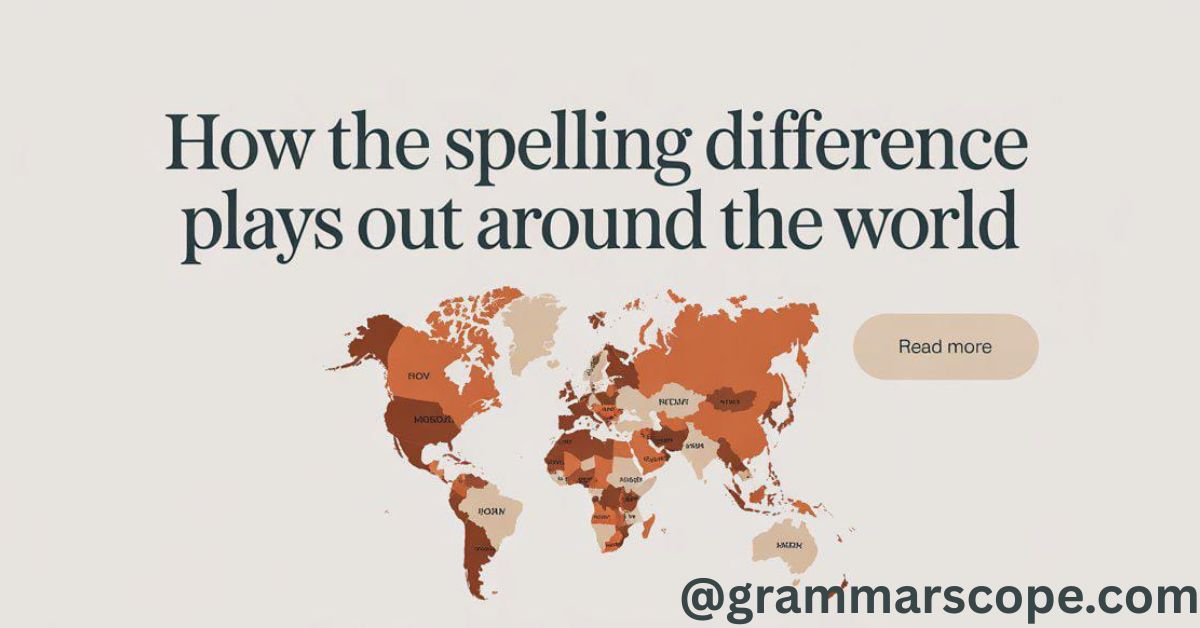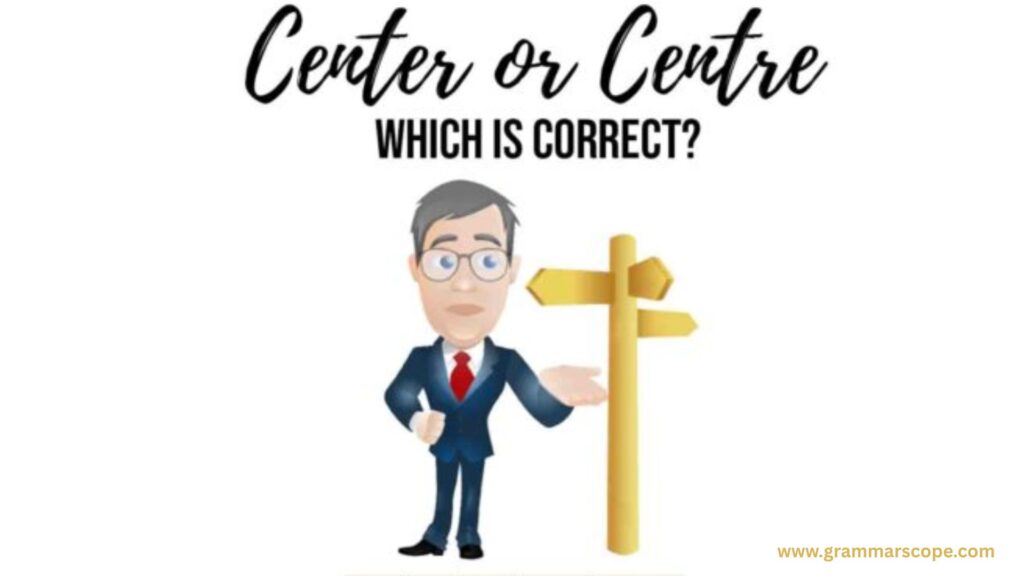Have you ever stumbled across the words Center vs Centre, the Spelling Difference, wondered why English has two ways to spell what seems like the same?e The difference between these two spellings is more than just a quirky detail. It’s a fascinating glimpse into how English evolved differently across continents, shaped by history, culture, and the practicalities of communication.
Whether you’re a student, writer, editor, or just someone interested in language, understanding the center vs centre spelling difference can improve your writing and help you communicate more clearly, especially when addressing international audiences. This article dives deep into the history, reasons, and real-world applications behind these two spellings, giving you a comprehensive guide to master their usage.
The Historical Roots of Center” and “Centre
To truly grasp the Center vs Centre Spelling Difference, we have to go back in time. Both words originate from the Latin centrum, which means the middle point of a circle or an area. This Latin term made its way into English through Old French, carrying the -re ending as centre. This spelling pattern was typical in Middle English and reflected the strong Norman French influence on English vocabulary and orthography.
For centuries, British English stuck with the traditional centre spelling, a form that echoed its French origins and fit the spelling conventions of the time. However, across the Atlantic, things were shifting. In the early 19th century, Noah Webster, an American lexicographer, aimed to reform English spelling to make it simpler and more phonetic. He argued that spellings should reflect pronunciation more closely to make the language easier to learn and more consistent.
As a result, Webster promoted replacing the -re ending with -er for certain words, including center. This shift aligned the spelling with how Americans pronounced the word, favoring a more straightforward, phonetic approach. Over time, this spelling became the standard in American English, distinguishing it from the British tradition.
The story of center vs centre reveals how language evolves not just through natural changes, but also through deliberate reform efforts influenced by cultural identity and practicality.
The American Embrace of “Center”
Why do Americans overwhelmingly prefer the center? The answer lies in the influence of Noah Webster and his 1828 dictionary, which sought to simplify and standardize American English spelling. Webster’s reforms removed silent letters, standardized irregular spellings, and favored spellings that matched pronunciation.
By changing centre to center, Webster brought English spelling closer to the spoken word. This change was part of a broader American pattern of simplifying spellings to aid literacy and education. Words like theater (instead of theatre) and meter (instead of metre) followed a similar pattern.
In everyday American usage, center is ubiquitous. Whether talking about a shopping center, sports center, medical center, or city center, Americans use this spelling without question. This choice isn’t just tradition; it improves readability and fits the rhythm of American English pronunciation.
Why the British and Commonwealth Nations Stick with “Centre”

On the other side of the English-speaking world, British English remains loyal to the centre. This spelling honors the language’s rich history and French influence, which shaped many English words.
British pronunciation naturally fits the -re ending, sounding softer and more formal. This spelling has endured in the UK, Australia, New Zealand, South Africa, and most Commonwealth countries. In these places, you’ll find the centre of everything from public signage to official documents.
Canada is a special case. Canadian English shows a hybrid approach, official government documents and formal writing often prefer centre, reflecting British influence, but center is frequently used in marketing or media aimed at the American market. This flexibility highlights how spelling can shift depending on the audience and context.
Navigating the Choice: How to Decide Between “Center” and “Centre”
If you’re unsure whether to use center or centre, the best approach is to consider your audience and the context of your writing. Geography is a strong guide: American English favors center, British and Commonwealth English prefer centre.
In professional or academic writing, consistency is crucial. Mixing center and centre in the same piece can confuse readers and undermine your credibility. Pick the spelling standard that fits your audience and stick with it throughout your document.
For businesses and brands, the decision can affect how customers perceive them. A company marketing in both the UK and the US might create separate versions of their materials to respect local spelling preferences. For international communication, many opt to choose one style (often American English) and maintain it for clarity.
For writers and editors working with diverse audiences, knowing these spelling conventions helps avoid embarrassing errors and shows cultural sensitivity.
The Wider Pattern er vs “re” in English Spelling
The center vs centre difference is part of a larger trend in English spelling. Many British English words ending in re are spelled with -er in American English. Other examples include theatre/theater, metre/meter, and litre/liter.
This pattern arose from historical pronunciation differences and reform movements like Webster’s. Americans simplified many word endings to reflect how they sounded, while British English maintained more traditional spellings.
Understanding this pattern can help you anticipate other spelling differences and avoid mistakes, especially in contexts like academic writing, international business, or publishing.
Cultural Significance: What Spelling Differences Tell Us About Language
Spelling isn’t just about rules; it’s about identity. Choosing between center and centre shows where you place yourself culturally and how you want to connect with your audience.
Language is a key part of cultural identity. Using the correct spelling shows respect for your readers and signals professionalism and attention to detail. It also reduces the risk of misunderstandings or distractions caused by inconsistent or unexpected spelling.
In a globalized world where English crosses borders constantly, these nuances strengthen communication and help build trust.
How the Spelling Difference Plays Out Around the World

The world map of center and centre usage splits into regions. The United States almost exclusively uses center, while the UK, Australia, New Zealand, South Africa, and much of the Commonwealth use centre.
Canada falls somewhere in between. Its bilingual culture and geographical proximity to the US mean it balances both forms, often switching depending on formality or audience.
| Region | Spelling Used | Examples | Notes |
|---|---|---|---|
| United States | Center | city center, shopping center | Phonetic, simplified spelling |
| United Kingdom | Centre | town centre, arts centre | Traditional British spelling |
| Australia & New Zealand | Centre | sports centre, community centre | British influence maintained |
| Canada | Both | shopping centre / shopping center | Depends on context & audience |
Certainly! Here’s the expanded FAQ section with H2 and H3 headings, using more detailed explanations to provide richer content:
FAQs: Center vs Centre The Spelling Difference
What’s the real story behind “center” and “centre”?
The words “center” and “centre” both refer to the middle point of something, whether it’s a location, an object, or an idea. The difference lies solely in regional spelling preferences. “Centre” is traditionally used in British English and most Commonwealth countries, while “center” is the preferred spelling in American English. This distinction comes from the history of the English language, influenced by different cultural and linguistic forces, including Latin roots and French spelling patterns that entered English centuries ago. Over time, these influences led to two accepted spellings depending on geography.
How did American English end up favoring “center” over “centre”?
The shift towards “center” in American English can largely be credited to Noah Webster, an early 19th-century lexicographer and language reformer. Webster believed English spelling should be simplified to reflect pronunciation more closely, making the language easier to learn and more logical. His famous dictionaries introduced and promoted changes like “center” instead of “centre,” “color” instead of “colour,” and “theater” instead of “theatre.” These reforms caught on across the United States and helped establish a unique American English identity that often diverges from British conventions.
Does using “centre” or “center” change how people understand the word?
Generally, no. Both “centre” and “center” carry the same meaning, and native speakers recognize both instantly. However, spelling can affect how professional or polished your writing appears, especially if you’re targeting a specific audience. For example, using “centre” in a US-based document might seem like a typo, while using “center” in British publications can feel out of place. Choosing the right version shows attention to detail and respect for your readers’ expectations, which matters in formal writing, academic papers, and branding.
Are there other words that follow the same -er vs -re pattern, like “center” and “centre”?
Yes, the -er and re ending difference applies to several other common English words that vary between American and British English. Examples include “theater” (US) vs. “theatre” (UK), “meter” (US) vs. “metre” (UK), and “liter” (US) vs. “litre” (UK). These pairs all stem from the same historical divergence in spelling conventions. American English tends to simplify the endings by placing the “-er” at the end, whereas British English preserves the older French-influenced “—re” endings.
When should I switch between “center” and “centre”?
The choice depends on your audience and the type of content you’re writing. If your readers are mainly from the United States or you are writing content for an American brand, “center” is the clear choice. On the other hand, if your audience is based in the UK, Australia, or other Commonwealth nations, you should use “centre” to align with regional norms. For international or mixed audiences, the best approach is to pick one spelling style and stick with it throughout your document to maintain consistency and avoid confusion.
What about countries like Canada or Australia? Which spelling do they use?
Canada is a bit of a hybrid when it comes to spelling. Officially, Canadian English tends to follow British spelling rules, favoring “centre,” “colour,” and “theatre.” However, American influence is strong, especially in informal writing and media, so “center” also appears frequently. Australia and New Zealand, meanwhile, consistently use British conventions, so “centre” is standard in signage, publications, and formal writing. These variations reflect the unique historical and cultural influences on English in each country.
Could mixing “center” and “centre” in one document confuse readers or harm credibility?
Yes, mixing spellings within a single text can distract readers and make your work seem careless or inconsistent. It may lead people to question the professionalism of your writing or editing. Whether you’re writing an article, a report, or marketing materials, choosing one spelling form and applying it consistently helps maintain clarity and trustworthiness. Inconsistent spelling also poses challenges for search engine optimization (SEO), as it dilutes keyword focus.
Does pronunciation change between Center vs Centre the Spelling Difference?
Interestingly, no. Despite the spelling difference, both “center” and “centre” are pronounced identically, with the emphasis on the first syllable. This pronunciation match was one reason Noah Webster argued for the American simplification—to align spelling more closely with how words sound. So, whether you say “center” in the US or “centre” in the UK, the spoken form remains the same, making the difference purely a matter of written convention.
Is one spelling more “correct” or “better” than the other?
Neither spelling is inherently more correct or superior. Both “center” and “centre” are correct within their respective language standards. What matters is that you use the spelling appropriate for your audience and remain consistent. Style guides for publishers, schools, or companies will usually specify which version to use. Ignoring these conventions might confuse or reduce your writing’s credibility, but it doesn’t mean one spelling is right and the other wrong.
How can I avoid common spelling mistakes involving Center vs Centre, the Spelling Difference?
To avoid mistakes, first understand your target audience’s spelling preference. Set your word processor or editing software’s language settings accordingly; most programs allow you to choose US or UK English, which controls spell-check and autocorrect features. Proofreading carefully also helps catch accidental switches between the two forms. Be mindful of autocorrect tools that might “fix” your preferred spelling based on default language settings. Finally, using online resources or style guides can provide clear rules to follow, helping you maintain accuracy and professionalism in your writing.
Final Thoughts: Center vs Centre, the Spelling Difference
The spelling difference between center and centre is a small but meaningful part of the rich tapestry of English language variation. Both spellings are correct in their respective contexts. The key to effective writing lies in understanding your audience and choosing the form that fits their expectations.
Consistency is your best friend here. Stick with one spelling throughout your work to maintain professionalism and clarity. Embracing the differences in English spelling enriches your language skills and helps you connect better with readers worldwide.
If you want to dig deeper into English spelling rules and learn about other interesting variations, reliable resources include the. These tools offer detailed explanations and examples to guide your writing.

Emma Olivia is an experienced blogger and the creative mind behind Grammar Scope. With a passion for language and years of writing expertise, she crafts engaging, informative content that simplifies grammar and writing tips for readers worldwide. Emma’s dedication to clear communication and love for the written word shine through every article she publishes, making Grammar Scope a trusted resource for language enthusiasts and learners alike.







